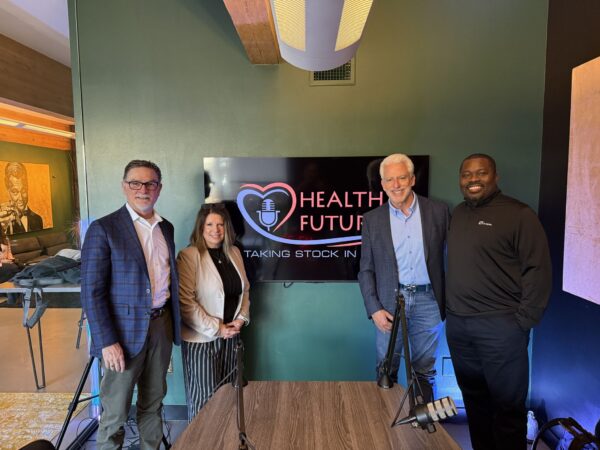On the latest episode of Health Futures: Taking Stock in You, host Bob Roth welcomed Fady Sahhar, President and Managing Partner of XtraGlobex, Inc.and long-time advocate for individuals with disabilities and older adults. Fady shared his remarkable journey from global consumer brands to disability advocacy and home care, and why he believes the future of aging in America depends on making home the true center of care.
🎧 For the full episode, CLICK HERE
A Journey Shaped by Resilience
Sahhar’s life path began with challenges that shaped his calling.
“I had polio at nine months old, and I’ve spent most of my life in a wheelchair,” he said. “My wife says that’s what keeps me humble.”
He came to the U.S. as a teenager from Beirut, Lebanon, and went on to study at the University of Tennessee. For 25 years, he worked on household names like Hanes, Hefty, and Progressive Insurance before deciding to take a different path.
“My midlife crisis was realizing I needed to give back to the community that helped me succeed,” he explained. “My purpose was to be an advocate, and I’ve been fortunate to couple that advocacy with the work I do.”
Clearing Up Costly Misconceptions
When Sahhar first entered the senior care and disability space, he quickly realized how confusing the system can be.
On my very first day I asked, ‘Would somebody explain the difference between private pay, Medicare, and Medicaid?’ I didn’t know,” he admitted. “Twenty years later, most families still don’t know.”
This lack of clarity leaves many unprepared for the costs of long-term care.
“Most Americans aren’t ready for the supports they’ll need, whether in-home care, assisted living, or durable medical equipment,” Bob Roth noted. “We have to be the ones to say, ‘No, Medicare doesn’t cover that.’ And that’s tough.”
Why Home Matters Most
As America’s aging population surges, both Roth and Sahhar agree the solution cannot be more hospitals and institutions.
“People thrive when they’re around others who help them stay active and engaged,” Sahhar said. “We should give older adults the chance to do as much as they can. Our role is to support how they want to live, not dictate it.”
Roth put it plainly: “We can’t build enough hospitals or assisted living. I see a world where home is the center of care.”
The Dignity of Risk
One theme Sahhar champions is the dignity of risk, respecting independence while ensuring safety.
“Everyone deserves the dignity of risk,” he explained. “Sometimes you have to let people take a couple of steps on their own. We’re not there to control their lives, we’re there to support them.”
This mindset shifts caregiving from “doing for” to “doing with,” keeping people in charge of their own lives.
Technology That Enhances, Not Replaces
For Sahhar, technology is a critical partner in care, but not a replacement for people.
“We employ technology not to take away from what we do, but to enhance it,” he said. “Ten years ago, giving grandpa a cellphone was a treat. Now it’s an expectation.”
From remote monitoring to smart-home systems and even 3D-printed parts for home modifications, the tools are evolving quickly, and becoming more affordable.
“We’re seeing collaboration between home modification companies and assistive technology,” he explained. “You can transform a home from unsafe to supportive at a fraction of what people think it costs.”
The Big Barrier: Homes That Don’t Fit Us
Yet technology alone won’t solve the biggest challenge: most U.S. homes aren’t built for aging.
“Less than five percent of homes are ADA-friendly, and under one percent can handle a wheelchair,” Roth said. “The first hurdle we see with older adults is the bathroom, stepping over a tub is just not safe.”
Sahhar agreed the sector needs new partnerships.
“We have to push payers, both government and private, to support modifications that allow people to live at home safely,” he said.
A Shared Commitment
At Cypress HomeCare Solutions, we know families often feel unprepared and overwhelmed as loved ones age. Sahhar’s story is a reminder that with the right supports, advocacy, and innovation, people can remain safe, independent, and fulfilled at home.
📝 This content is intended for educational purposes only and should not be considered medical advice. Please consult professionals regarding your individual needs.




